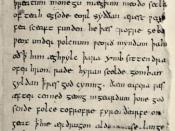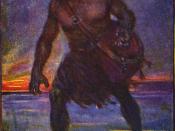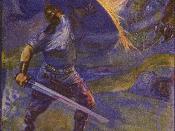Throughout the postmodern novel, Grendel, the protagonist comes to an understanding of himself and his true place in the world. Grendel believes he is in a solipsistic universe and deems only himself as significant. Though the humans see Grendel as a monster, Grendel sees himself superior to everything he knows of. The Shaper, an Anglo-Saxon court bard, is seen as a pest in Grendel's eyes; yet he feels strangely attracted to his songs. Grendel sees Hrothgar, ruler of the Danes, as truly evil and pitiful. The ever so frustrating Dragon frightens, infuriates, and informs Grendel of many disturbing ideas. Grendel becomes exceptionally intrigued by Beowulf, and sees him as a relief from his boredom. In the end, Grendel is aware of his place in the grand scheme of things and acts on his own accord.
Solipsism is the theory that the self is the only one that exists.
Grendel discovers this idea while he is being attacked by a very real bull. The reader then can assume that Grendel's definition of solipsism could be that he is the only producer of meaning. Grendel says, "I understood that, finally and absolutely, I alone exist⦠I create the whole universe, blink by blink-An ugly god pitifully dying in a tree" (22)! This encounter with the bull allows Grendel to discover an entirely new way of thinking; one that will be tested in the future.
Grendel possesses intelligence and primitive human qualities, yet he is an utterly grotesque monster with volatile behavior. His intellect manifests itself when he encounters the bull. Grendel immediately sets himself apart from the bull, and distinguishes that the bull acts on pure brute instinct. Now, he sees the bull is not a thing in and of itself, yet merely understands it in its capability...


